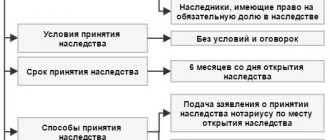Checking the fact of inheritance
If you are on good terms with your relatives, they will inform you of the death of the testator and tell you about the remaining property. But if it is not possible to obtain any information from them, you should contact a notary at the place of last residence of the testator.
You can find out whether inherited property has been left to you or not only after the death of the testator.
When contacting a notary office, you must submit a certain list of documents. It is worth considering that a notary may refuse to accept an applicant’s application for inheritance if more than 6 months have passed since the opening of the inheritance.
Read more about ways to check inheritance rights in the material “How to find out about inheritance.”
Some practical tips for receiving an inheritance
The death of a relative is always a sad event, but it also foreshadows troubles with the inheritance. Before you initiate probate proceedings and look for a list of assets, find out whether the person left a will. You can look for it both in the testator’s house and at the notary’s office, who, by law, must conduct inheritance cases in the territory where the deceased lived in recent years. If it exists, then 6 months after the date of death the persons designated in it will be able to simply enter into inheritance.
If a will was not left, then when applying for inherited property to a notary you must have with you:
- Death certificate of the deceased.
- Passport with citizenship of the Russian Federation.
- Documents that somehow confirm a family relationship with a person.
- Documents for the deceased's real estate, confirming his ownership.
Not only birth certificates of children, marriage or divorce, but also adoption documents or certificates confirming another degree of relationship are suitable as documents certifying a person’s ability to inherit. All necessary documents and confirmations can be ordered from the civil registry office at your place of residence.
It is worth remembering that some relatives have a priority right to receive an inheritance. This applies to children, parents or spouses of the deceased.
How to find out if there is a will
Since citizens present when drawing up a will do not have the right to disclose the existence and contents of the document, it is not easy to find out whether a deceased relative left a will.
Until the day the inheritance is opened, the notary and witnesses are required to keep secret information about who the testator bequeathed his property to.
Only after a relative has passed away can you try to find the papers. However, heirs most often do not know where to make requests to search for the property of the deceased.
If the testator does not inform about the place of storage of the document, the heirs have to search for it on their own. You can find the paper in the testator’s apartment, at the notary at the place of last registration of the testator, or by sending a request to the notary chamber.
More detailed information on how to find a document proving the existence of inheritance rights is in the article “How to find out if there is a will for inheritance.”
How to find out if there is a will for inheritance
Before contacting a specialist for help, try to find the will in the deceased's belongings. If you were in a close family relationship with a person and knew his neighbors, friends, or other family members, you can try to find out if they have paper.
If you cannot rely on relatives or mutual acquaintances who can bring you up to date with the matter, then the only thing left is to turn to a notary for help or, for example, to the medical institution where the testator was in the last days of his life.
Read more about how to find out if there is a will for inheritance.
Whom does the notary inform?
The notary notifies only those heirs whose place of residence is known to him about the opened inheritance. If the heirs do not know about the opening of the inheritance and do not enter into their rights within six months, they can restore the missed period within 3 years from the date of receipt of information about the death of the testator.
The notary can only learn about the death of the testator from the heirs. Neither law enforcement agencies nor the registry office provide information about the death of citizens.
Accordingly, an heir who knows or has assumptions about the existence of inherited property must take measures to discover and register it independently.
Read more in the separate article “How a notary finds out about the death of a testator.”
Search for heirs
Notaries search for heirs within the framework of inheritance cases in which they deal. Most often, Russians faced with questions of opening an inheritance believe that notaries are obliged to look for heirs who have not shown up on their own. However, in the absence of additional payment and the prospect of significant time spent on searches, is the notary obliged to search for heirs by law?
His direct responsibilities include notification of the opened inheritance case only to those successors about whom he has information. To search, he can use the heir’s registration and residence address, the address of his place of work, telephone number - personal and work, as well as location data received from knowledgeable persons.
The search for heirs by a notary can be carried out in several ways:
- search by address and last name - sending notices to existing home or work addresses;
- posting information about the search on the websites of notary offices;
- through other legal successors;
- submitting an announcement about the opening of an inheritance to a newspaper.
However, sites with data about wanted heirs do not always turn out to be truthful. Some advertisements are posted by scammers who want to extract money from citizens by fraudulent means.
When considering the question of whether a notary should search for heirs, it is worth noting that heirs themselves are most often interested in the possibility of assuming their legal rights.
If none of the legal successors is declared, then the inheritance is recognized as escheated and transferred to the ownership of the state.
The notary, contrary to popular belief, searches for heirs based on his capabilities. Accordingly, this is a right to search for inherited property, and not an obligation.
Independent search for inheritance and heirs
Searching for an inheritance can be done in several ways. Firstly, this can be done with the help of relatives. Secondly, on the basis of the will, by last name, and also based on information about bank accounts and foreign activities of the testator.
Receiving responses from the bank and from abroad may take a long time, so the heir should be patient.
It is difficult to find an inheritance by last name on your own. To do this, you will have to contact all banks in order to determine the presence or absence of a deposit. It is more advisable to involve employees of a notary office or interact with search specialists.
The Internet will help you find heirs on your own. In special databases, anyone can place data on the search for a legal successor. Checking through these platforms greatly simplifies the search for heirs under a will.
Often people do not want to look for relatives with whom they will have to share property according to the law. However, the notary must distribute the inheritance based on the document. And if the heir was not notified of the will, he can sue and expect to receive his share of the property illegally acquired by other heirs.
What is the Register of Wills
A special register of wills has been created in the Russian Federation, which makes it possible to make the activities of notaries more transparent for the population and reduce the number of deceptions and frauds in the process of receiving an inheritance. This information system includes information about wills and completely protects testamentary secrets.
Private and public notaries transmit information to the electronic service. This allows you to store data on wills in a single system, which facilitates the search for documents and the procedure for receiving an inheritance after the death of a relative.
The service facilitates rapid processing of information and making changes to existing documents.
Thanks to a single database, everyone can find a will drawn up by a relative. This method will help even if the original document has been lost.
Since the emergence of a database of inheritance cases in Russia, there has been a decrease in the number of crimes related to inheritance. Entry to the site is restricted to unauthorized persons. Employees involved in data processing sign a non-disclosure agreement.
Representatives of the notary chamber, at the request of relatives, provide information about the place and timing of drawing up a will, so that the heirs can contact the notary office and begin processing the documents.
Such information can be obtained only after the death of the testator, as noted above when considering the question of what right a notary has to identify heirs. At the notary's office you need to fill out an application and submit the following documents:
- death certificate of the testator;
- Russian passport;
- a paper indicating the degree of relationship with the deceased citizen.
How to find out about inheritance in another city
In order to obtain information about the fact of opening an inheritance, you can submit an application to the registry office of your city, so that it can send a request to the city where the testator lived. This is only possible if you have family ties with the deceased.
And in order to find out about the will, you can send a request by registered mail to the relevant notary office or notary chamber. The letter must include copies of the documents we indicated above.
Another option to avoid unwanted travel is to issue a power of attorney to a representative who will deal with all matters without your presence. It can be either a relative or a person from outside your family, for example, a lawyer.
Find out more about how to enter into an inheritance in another city.
The procedure for opening an inheritance
Most often, citizens are not aware whether the heir is obliged to inform the notary about the presence of other heirs. But since the procedure for opening an inheritance case begins with the preparation and submission of an application for the acceptance of property by each heir, there is no need to inform the specialist about other applicants for the inherited property.
A package of documents is attached to the application. On their basis, the heir is issued a certificate confirming the right to the inherited property.
Entry into rights
Entry into inheritance is understood as a procedure that confirms the fact of a change of owner and the complete transfer of the rights and obligations of the testator to one or more heirs.
The notary transmits information about the opened inheritance. He may summon the legal successors by means of a media report or by posting a public notice. Whether a notary is obliged to notify about entering into an inheritance is stated in Art. 61 “Fundamentals of the legislation of the Russian Federation on notaries.”
The procedure for entering into inheritance rights involves:
- contacting a notary office with a statement of desire to enter into an inheritance;
- collection of documents;
- payment of state fees/notary services and registration of transfer of ownership.
A notary who has received a message about the opening of an inheritance is obliged to notify the heirs whose place of residence or work is known to him.
You will find more detailed information about the procedure, terms and options for entering into inheritance rights in the material “Entering an inheritance.”
Where can I find out about inherited property?
Movable property
The most difficult part of the inheritance. It is quite difficult to establish the fact of ownership of things of this type, usually motor vehicles. Information about the ownership of a car or work equipment is practically not recorded anywhere. The easiest way is to submit a request to the traffic police. Purchase receipts, receipts, and other proof of ownership and legally binding documents are acceptable as evidence.
Bank accounts
In most cases, after a person dies, bank deposits of varying sizes are left behind. The legislation of the Russian Federation gives notaries the right to request information about the status of the accounts of their recently deceased client in order to include this data in the inheritance case.
The difficulty in this case is that it is not known in which banking organization the recently deceased kept his money. In this case, the notary sends a request to all banks operating in the client’s territory of residence. Potential heirs can also apply to the bank to provide such information, but they will have to prove their relationship with the client.
This is worth doing only if you know exactly in which bank the testator kept the money. Otherwise, it is better to leave this matter to a specialist, since his request will be answered much faster. By law, the bank must respond within 30 days of the request. In this case, the information will be provided to the heir only if there is a completed will.
Real estate
This is the most “visible” property. In Russia, there is Rosreestr, an organization that stores information about any real estate in the country and its owners. After purchasing, privatizing or acquiring real estate in another way, each person is required to enter information about the transaction and ownership into Rosreestr, while paying a small state fee.
At any time, you can request a paid extract from Rosreestr, which will list all real estate of any type that belonged to the heir. This can be done by a Russian citizen independently or entrusted to a representative of a notary office who has access to the database.









